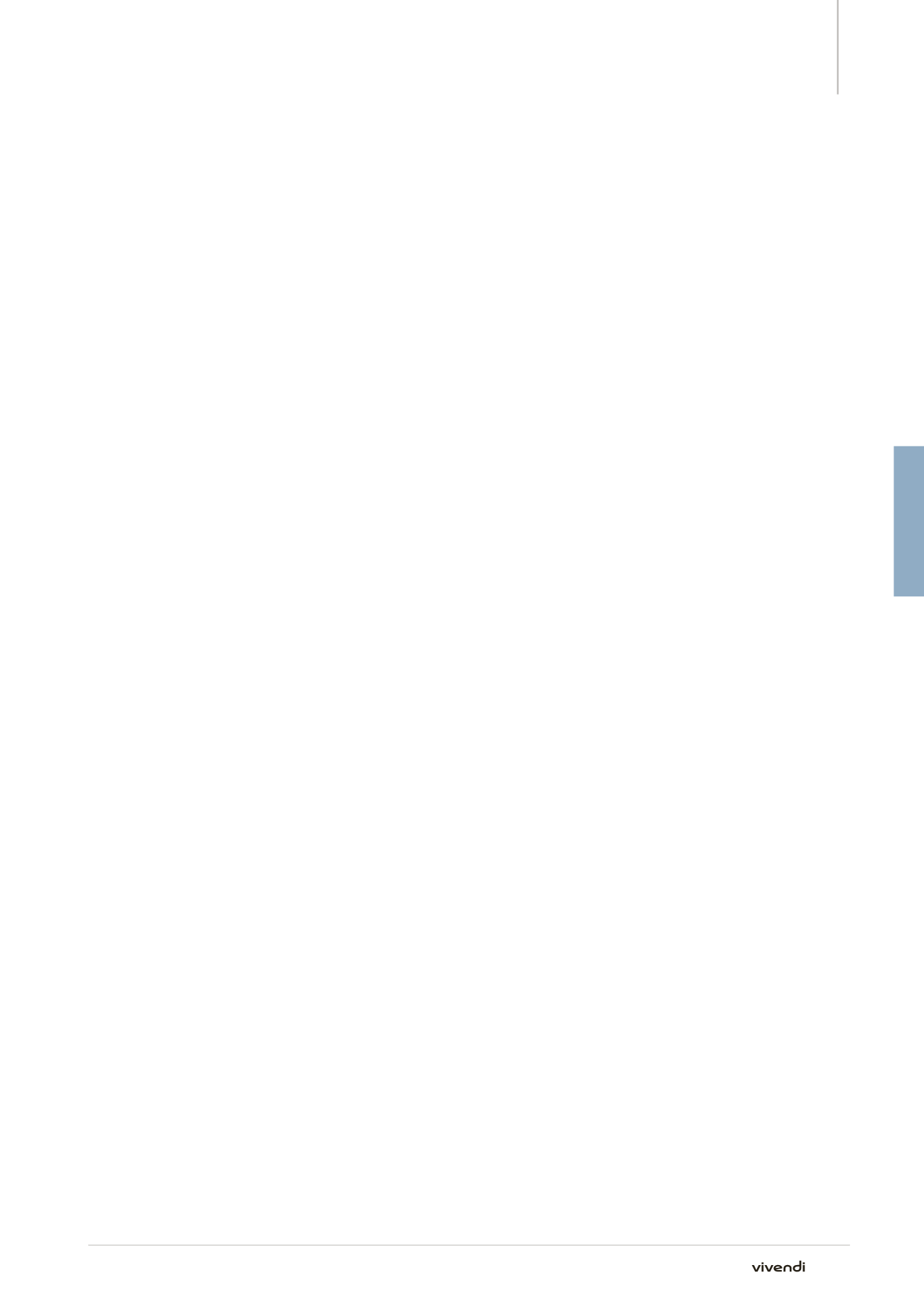

3
Information about the Company | Corporate Governance |
Reports
The Company manages internal control through a set of procedures
established by Vivendi’s Management Board and implemented by its
employees to ensure that the following objectives are met:
p
p
compliance with laws and regulations as well as adherence to the
group’s corporate values;
p
p
the implementation of guidelines and strategies established by the
Management Board;
p
p
the prevention and monitoring of operational and financial risks as
well as the management of risk of error, fraud, and reputation;
p
p
the optimization of internal processes to ensure effectiveness of
operations and efficient use of resources; and
p
p
completeness and accuracy of accounting, financial and management
information.
To achieve each of these objectives, Vivendi has defined and implemented
general principles of internal control based to a large degree on the
framework established by the report of the Committee of Sponsoring
Organizations of the Treadway Commission (COSO) published in 1992
and updated in 2013, as well as the reference framework of internal
monitoring processes and the recommendations of the French
Autorité
des marchés financiers
(AMF).
These principles are based upon:
p
p
a policy that contributes to promoting a culture of internal control and
principles of integrity;
p
p
identification and analysis of risk factors that may adversely impact
achievement of the group’s objectives;
p
p
the organization and establishment of procedures aimed at ensuring
the implementation of the goals set by the Management Board;
p
p
periodic review of control measures and an ongoing search for areas
of improvement; and
p
p
the process of channeling information relating to internal control.
However, as with any system of control, the application of these
principles cannot provide an absolute certainty that all risks will be
completely eliminated or controlled.
4.3.2.
Scope of Internal Control
(1)
Vivendi Village includes Digitick, See Tickets, Wengo and Watchever.
4.3.1.
Definition and Objectives of Internal Control
Vivendi is currently organized into three business units: the Canal+
group, the Universal Music Group and Vivendi Village
(1)
. Each of
these entities must implement the strategies set by the Management
Board, including objectives in the area of internal control. SFR and
GVT were classified as assets held for sale pursuant to IFRS 5 - Non-
current Assets Held for Sale and Discontinued Operations. The sale
of SFR was completed on November 27, 2014 and the sale of GVT is
ongoing. Each entity has a tailored set of internal control measures that
includes both the implementation of the group’s procedures and the
definition and implementation of procedures specific to each business
unit, depending on its organization, culture, risk factors and operational
requirements. Vivendi, as the parent company, ensures that such internal
control measures exist and adequately address the needs of each entity,
particularly with respect to the accounting and financial procedures
applied by group entities that are fully consolidated.
4.3.3.
Internal Control Components
■
■
4.3.3.1.
Control Environment
Rules of Conduct and Ethics Applicable to All Employees
Vivendi ensures that all aspects of corporate responsibility are taken into
account. Vivendi has therefore established a charter of the group’s values
that includes consumer focus, creativity, ethics, cultural diversity and
corporate and social responsibility. Vivendi is a signatory of the United
Nations Global Compact.
A Compliance Program also sets general rules of ethics applicable to
all group employees regardless of their seniority and position. These
rules, available on the Vivendi website at
www.vivendi.com, cover the
following areas: employees’ rights, integrity and protection of information
and personal data, prevention of conflicts of interest, commercial
and financial ethics, protection of the group’s assets and resources,
environmental respect and corporate social responsibility.
The Compliance Program has three major purposes:
p
p
to raise awareness among the group’s employees and provide them
with a reference tool and guidance for determining appropriate
courses of action;
p
p
to minimize to the greatest extent the risk of civil and criminal liability
for both the group’s employees and companies; and
p
p
to discuss in depth a cross-disciplinary theme each year. For
this purpose, over the past five years, the following topics have
been addressed: conflicts of interest, protection of personal data,
preservation of tangible and intangible data, anti-corruption measures
and the proper use of digital media within social networks. The 2014
report focuses on the progress made by subsidiaries in implementing
their procedures regarding fraud, corruption and conflicts of interest.
The Compliance Program establishes rules of conduct based on general
principles of international law, including those established by the OECD,
ILO and European Union law, as well as legislation in Europe and various
countries, principally those of France and countries with legal systems
based on common law. Following this approach, each operational
business unit has also established its own Code of Ethics.
The group’s General Counsel and Company Secretary and the Compliance
Officers of the principal business units work to ensure the overall
consistency of the program. An annual Activity Report is presented to the
Audit Committee, which then reports to the Supervisory Board.
149
Annual Report 2014



















